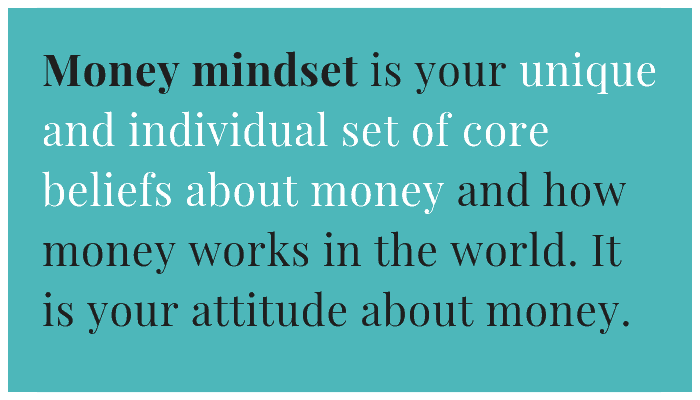The mechanics of personal finance are easy. Spend less than you make. Invest for the future. Don’t buy crap you don’t need.
But as anyone who has ever set a money goal knows, implementing those rules is a lot more complicated. The stories we tell ourselves limit our ability to make change in our financial lives. We stress about things that should be a non-issue. And, oh my goodness, do we struggle not to overspend on food.
So, today, I brought in a special guest to talk to us about improving our money mindset. Debbie Sassen is a personal finance coach who helps people shift their perspective on money in ways that helps them feel more abundance in their lives. Her tools and tips can help you understand where your money struggles are rooted, so you can know where to go next.
Table of Contents
Your Money Mindset Matters
I have to admit it. I was a bit of a late bloomer when it came to money mindset. You see, back in the day, when I was working in corporate finance, money was pretty straightforward: dollars and cents, money in, money out; interest rates, stocks, bonds, economic forecasting. The usual.
And when it comes to our household finances, it’s pretty straightforward, too. I have a large family – eight kids and a husband, plus the occasional gerbil or goldfish – so there’s not much wiggle room. We spend less than we earn, save for a rainy day and contribute to our retirement accounts.
So I was in for a surprise 10 years ago when I shifted from corporate finance to personal financial planning. That’s when I began noticing that smart, accomplished people, even those who earn good salaries and are at the top of their field, get triggered and stressed about money. I started hearing comments like “I don’t swim in these waters;” “I’m financially learning disabled;” and “Debbie, I need courage to meet with you.”
And I realized that there’s another side to money. The not-so-straightforward side of the coin called Money Mindset.
In this article, we’ll explore what is money mindset, where does it come from, why you need to know about it, and how you can change your money mindset.
So let’s dive in.
What is Money Mindset?
A money mindset is your unique and individual set of core beliefs about money and how money works in the world.
It is your attitude about money. Your money mindset shapes what you believe you can and cannot do with money, how much money you believe you’re allowed, entitled, and able to earn, how much you can and should spend, the way you utilize debt, how much money you give away, and your ability to invest with confidence and success.

Your money mindset influences your attitude toward people, both rich and poor. Do believe that rich people are evil, mean, materialistic and greedy – so you don’t want to be like them? Do you believe that poor people are noble and virtuous, the salt of the earth – so it’s better to be like them?
The way you handle yourself in financial conversations is another indication of your money mindset: do you feel vulnerable and intimidated or confident and in control? Are you comfortable asking questions – either yes, because you feel safe asking; or, alternatively, no, because you’re shy and embarrassed. Do you have an unconscious belief that money is a man’s world and women shouldn’t bother about it?!
What’s fascinating about our money mindset is that this core set of beliefs resides in our unconscious mind. And it can hang out there, dormant. But, by becoming a keen observer of your thoughts, feelings, bodily reactions, and interactions with money you gain awareness of your current set point and the ability to change your mindset.
How is your money mindset formed?
Many of our core beliefs about money are formed in early childhood by observing and internalizing the money messages we learned from our parents, friends, community and other caregivers. Especially our parents.
Little children are like little sponges. We keenly observed how the adults closest to us dealt with money and with life – did your parents fight about money or were they calm and collected when family finances came up in conversation?
Was there enough money when you were growing up or was it a struggle? Death, divorce, illness, unemployment and other hardships frequently lead to financial stress, tension and feelings of scarcity.
How did your parents talk about other people and their money? Did they make snide remarks about the rich b!tch? Did they pay taxes willingly or bad-mouth the government and complain about corruption?
If you were born into a family that believed that “people like us don’t get ahead” you might be holding onto a similar unconscious belief. Earning more money than your parents might make you feel really uncomfortable.
Growing up in material comfort, with thoughtful, generous parents who speak with each other and about other people calmly and respectfully positively impacts your money mindset.
The historical era in which you grew up also influences your money mindset – and depending on where you are in line in the family, you and your siblings may have grown up in a different historical era and you may each have a different money mindset.
Why is it important to understand your money mindset?
Understanding your money mindset and where it came from, helps you change it. Just like you plug your coordinates into the navigator before setting out on a journey, so too do you want to know and understand your current beliefs about money.
As you shift your mindset, knowledge of where you started helps you realize just how far you’ve come. It’s like looking at the navigator and knowing that you’ve already traveled 200 miles. The difference with money, though, is that it’s the journey of a lifetime. We never really arrive at the destination. We just keep growing. The goal is the journey.
How do you shift your money mindset?
Shifting your money mindset starts with awareness. Pay attention to your thoughts, behaviors, and actions around money. Your thoughts about money will influence your feelings. And your feelings affect your behavior.
So, for example, if you think that money is a scarce commodity, you’ll feel stressed and anxious. You might lash out at people in your family for their financial frivolity, carelessness or money mistakes. You won’t be generous and you might even hoard money and material possessions.
Conversely, if you think that there is more than enough money to go around, you’ll feel calm, positive and optimistic. You’ll openly share, be generous and take chances with your money on new endeavors and investments.
I like to envision money mindset as a scale with Scarcity and Lack at one end of the scale and Wealth/Abundance at the other end:

Note, that your money mindset has nothing to do with how much money you earn or how much you actually have. There are wealthy people who live with a scarcity mindset, believing that there is not enough money to go around and they will never have enough. And there are people of minimal means and possessions who feel blessed, abundant and wealthy on a bone-deep level.
Most of us are somewhere in between the two extremes.
As you become more aware of your mindset, you’ll encounter your own limiting beliefs and money blocks that get in the way of change. These beliefs prevent you from feeling and acting more abundant. This is perfectly normal. We all have money blocks. They never go away. Limiting beliefs and money blocks keep reappearing in newer and different forms. Your work is to continually uncover the blocks, dissolve them and release them so you can build a healthier and more confident relationship with your wealth.
To get started, test yourself by marking the following statements True or False, or somewhere in between:
True or False?
- I’m no good with money.
- I’m not smart enough to make a good living.
- Money doesn’t grow on trees.
- I always make the wrong money decisions.
- I don’t deserve to earn more money.
- I’m financially learning disabled.
- People in my field never make enough money.
- Money isn’t spiritual.
- I’m no good with numbers.
- My income is play money. My partner’s money is the real money.
- Money is a man’s world.
- Money can’t buy you love.
- I always make dumb money decisions.
- Having money costs too much.
- People won’t like me if I’m wealthy.
- Rich people are snobby and shallow.
- Poor people are hardworking and noble.
- Money makes the world go around.
- There’s a limited supply of money in the world.
- Money burns a hole in my pocket.
Another helpful exercise is to explore your childhood money story. Take 10 or 15 minutes to write out the answers to the following questions:
Money Mindset Prompts:
- What money messages did you learn from your mother?
- What money messages did you learn from your father?
- How did your parents save and spend money?
- Was money talked about calmly, or was there only tension and fighting?
- Did you work as a young adult? Why or why not?
- Were you allowed to keep the money you earned or did you hand it over to your parents?
- How were you taught to save, budget and donate money?
- How might the money messages you inherited from your caregivers be affecting you today?
Finally, create more awareness by noticing how you behave today. When you go out to dinner of coffee with friends – do you always pick up the bill or do you never pick up the bill? What does that say about you and the way you interact with money?
When you get paid – does money burn a hole in your pocket? Do you feel like you need to get rid of it or give it away? Do you believe that it’s not safe for you to hold on to money?
How you feel when you have to ask for money (e.g. negotiating price or wages or invoicing a client)? Do you tense up or get nervous? Do you feel a pit in your stomach or a tightening in your chest? Do you feel you’re worth a certain amount of money – and no more?
Finally, have you made any money mistakes that you just want to kick yourself for? It’s completely normal! We all make them. It’s part of our financial initiation and money maturity. Plus, very few of us were taught anything about proper money management from our parents or school systems. So we learned by osmosis and trial and error. Forgive your money mistakes. Let go of the past and release any shame, guilt or stress that you’re feeling.
With greater awareness of your money mindset, you can now start taking action to change your money mindset and transform your relationship with money.
Rewrite your limiting beliefs as positive money affirmations.
Earlier, you explored some of your core beliefs and attitudes about money. Write down 5 of your limiting beliefs. I recommend starting a money journal.
Here are a few examples, but write those beliefs that reflect your current reality:
- I can’t figure out money because my family isn’t the type that’s very good with it.
- It’s not OK or fair to be wealthy while there are so many people in the world who are less fortunate than I am.
- If I take good care of my money and become rich, I’ll lose my friends and my support system because I’ll be different from them.
Since limiting beliefs impact the way you handle money and block the flow of wealth and financial confidence into your life, you need to rewrite your beliefs as positive money affirmations. Use the present tense to let your subconscious mind know that this is your new reality.
For example:
- I am a successful money manager who has transformed the age-old family pattern of money mismanagement. I am using my resources to take good care of myself and my family and to do good in the world.
- I invest my money responsibly and with confidence. Having wealth enables me to support others and to do good things in the world. Without wealth, my impact and contribution are limited.
- I am grateful for my true friends who love me just the way I am and who support me through thick and thin.
Now it’s your turn to rewrite your limiting beliefs. Use your money journal to write out your positive affirmations twice a day – morning and night. Continue writing the same affirmations again and again, until you notice that you have truly shifted your money mindset.
Then start working on the next set of limiting beliefs. Your money work is never done.
Make small changes to shift your money habits and behaviors
Commit to making small shifts in your money habits. For example:
If you never look at your financial statements – if you get most of them digitally, they’re easy to ignore! – commit to looking for 5 minutes a day.
If you have no idea what’s flying with your money, start tracking your expenses. Write down everything you spend. You don’t have to do anything with the information yet. Just get going.
If you already track your spending, you have a lot of information. Create a budget or a spending plan at the beginning of the month. And stick to it. Make sure to set aside money for savings and investments.
Commit to giving charity. Start with $5 a week if this is a new habit. Feel confident that any money you give away will come back to you multiplied.
Summary
Your money mindset is comprised of your unconscious thoughts and beliefs about money and how it works in the world. But it is not fixed. Your money mindset is not set in stone and it does not need to define the person that you are. You have the power and capacity to change it.
Every morning when you wake up, you can create new thoughts and enact different behaviors. It doesn’t matter where you were yesterday or a month ago or a year ago. You can choose to take control of your money – and your money mindset.
Shifting your money mindset is a journey. If your goal is to enjoy a more joyful, abundant and confident relationship with your money, it’s time to get started. The goal is the journey.
Ten years ago, Debbie Sassen left institutional finance and began working with individuals to help them find order and empowerment in their personal finances. Her coaching approach is a perfect mix of no shame, blame or judgment with practical skills and money mindset work that helps women and families become leaders of their finances. Debbie works with clients 1:1 and through her signature online classes Smart Women Build Wealth and Investing Made Simple. She strongly believes that stepping into your value and worth as a person is part and parcel of owning your financial future. You can find Debbie online at: http://debbiesassen.com






Pingback: What To Do When Your Money Mindset Work Isn’t Working | Debbie Sassen